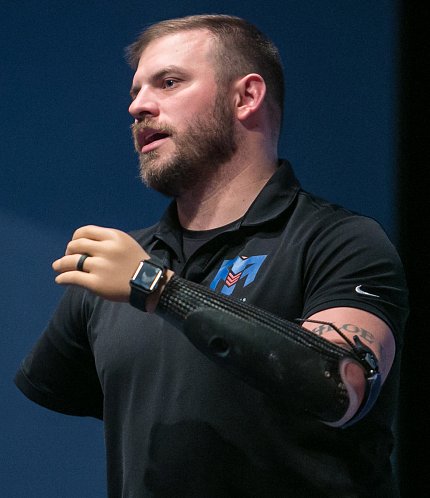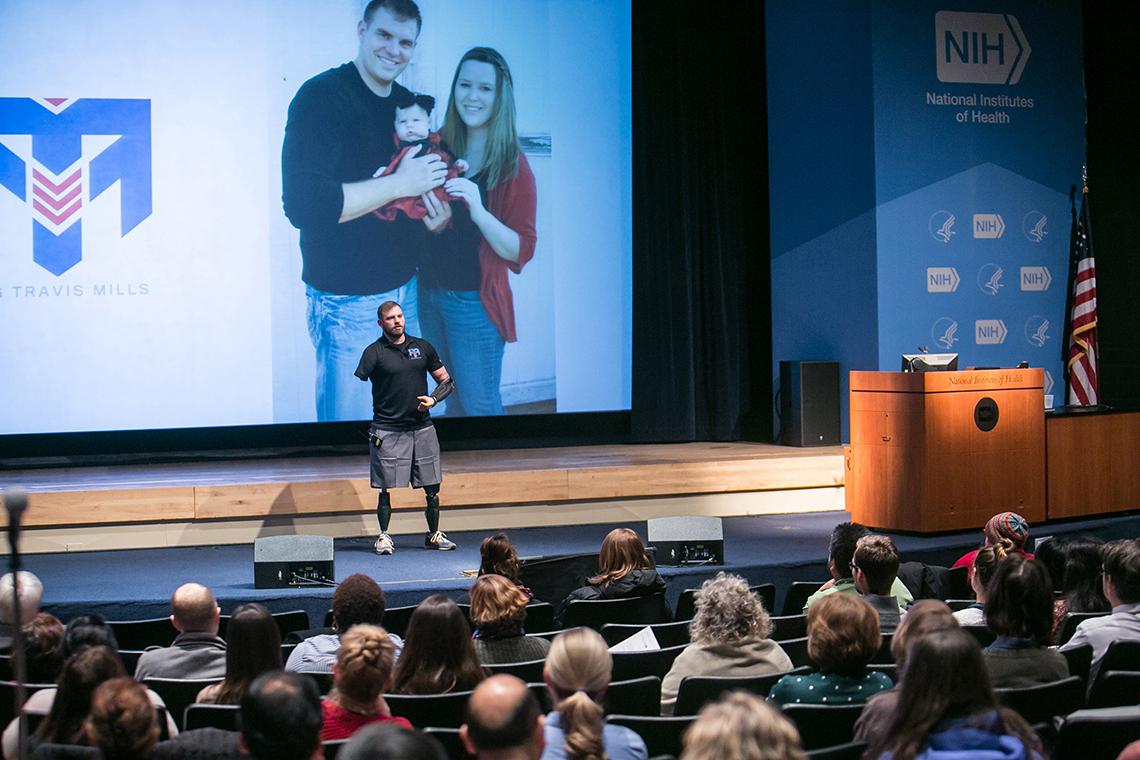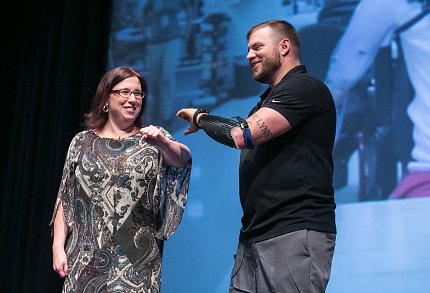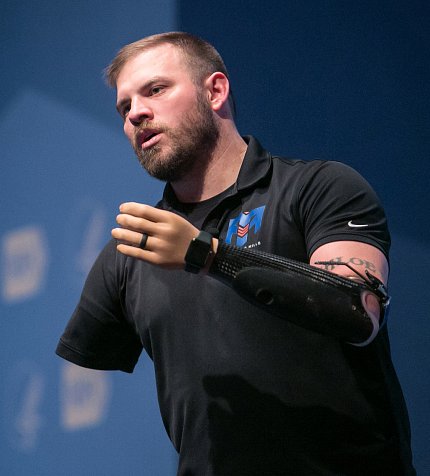'Recalibrated Warrior'
Injured Veteran Shares Inspiring Story

Photo: Chia-Chi Charlie Chang
A bad day at work usually doesn’t have lifelong repercussions. When Travis Mills had a bad day at work—on Apr. 10, 2012—it would affect every day of his life going forward. Mills, a retired U.S. Army staff sergeant, lost all four limbs that day, during his third deployment in Afghanistan. Yet he’s not just surviving, he’s inspiring countless others through his determination, humor and optimism.
Just don’t call him wounded. “I hate being called wounded,” Mills told the crowd during a recent Deputy Director for Management seminar in Masur Auditorium. “I prefer recalibrated warrior.”
Mills is 1 of only 5 servicemen from the Iran and Afghanistan wars to survive injuries as a quadruple amputee. On that hot April day in Afghanistan, he and his troops strapped on gear to sweep the ground for bombs. They didn’t find any until Mills tossed down his backpack, which landed on a bomb. The explosion nearly killed him and injured two other soldiers.
Speaking at NIH, he said, “I just hope I don’t bomb this, because last time look what happened...” He paused for effect and smiled, inviting the crowd to laugh with him. “I’m gonna be like that bomb in 2012; it will be a surprise. You’re not gonna see this coming.”
Now, as a motivational speaker and international advocate for veterans and amputees, the gregarious Mills said, “I tell jokes to disarm the situation.”
When the accident happened, medics rushed over to Mills, tying tourniquets around his four limbs to stop the bleeding. “In my head, I’m not going to make it,” Mills recounted. “I’ve seen guys die from a lot less. I told my medics, ‘Don’t worry about me; you’re not gonna save me. Go fix my guys.’”
The medics put Mills on a chopper to Kandahar where he was rushed into surgery, the first of which lasted 14 hours. He’d need more than 30 blood transfusions. “It’s pretty incredible,” Mills said. “Had they loosened one tourniquet, I’d have died within 3 minutes.”

Photo: Chia-Chi Charlie Chang
In those first days, upon realizing the extent of his injuries, Mills said he became withdrawn, embarrassed and angry. He doubted he could be a proper husband and father. How did an athletic, active guy from small-town Michigan wind up here?
But then he was transferred to Walter Reed National Military Medical Center, reunited with his wife Kelsey and baby daughter Chloe and his outlook began to change. He was further motivated by a visit from another quadruple amputee vet, Marine Cpl. Todd Nicely, who told Mills he would again dress and feed himself, walk and even drive.

Photo: Chia-Chi Charlie Chang
With hard work, Mills eventually did relearn these skills. It took many grueling months of rehabilitation, some high-tech gadgets and a devoted medical team that included therapist Dr. Kerry Quinn, who sat in the front row of the lecture. “She’s the whole reason I can walk again,” Mills said.
At first, the pain was so debilitating, Mills needed ketamine to reset his nerves. Five weeks into recovery, he used his prosthetic hand to feed himself. Learning to walk was a more arduous process. He had to build up his hips and core just to sit up. After some time in a wheelchair, Mills strapped on prosthetic legs and began to walk. His legs have microprocessors that, each time he moves, make hundreds of internal adjustments to keep him upright. What’s more, they’re waterproof and have a Bluetooth remote to help him drive.
Five months after his injury, Mills walked a 5K in New York. The firemen who had invited Mills offered to push him in a wheelchair but Mills insisted on walking. He ached, bled and fell over at the end, but he pushed himself to finish the walk.
Mills is already plotting a good use for his prosthetic hand, which can clamp down with 25 pounds of pressure, perhaps even 35 pounds eventually. In 10 years, he said, when his daughter’s date comes to the door, he’ll shake the guy’s hand and ask if it hurts. No? Let’s try 35 pounds of pressure. And, he quipped, his hand won’t leave fingerprints.

Photo: Chia-Chi Charlie Chang
As Mills grew stronger, the initial despair he’d felt after his accident dissipated. “I can reminisce about the 25 years I had with arms and legs and be grateful,” he said. But he couldn’t undo what had happened, so he realized there was no point in dwelling on the past.
“I learned I can still be active in society and do things with my family, adaptively,” he said. “I really am happy and thankful for the life I get to live.”
In addition to writing a memoir, Tough as They Come, and appearing in a Netflix documentary, Travis: A Soldier’s Story, Mills started a nonprofit to assist other combat-injured veterans. The Travis Mills Foundation started out sending care packages overseas but has grown to hosting injured vets and their families at his foundation’s Veterans Retreat in Maine, where guests enjoy adaptive recreational activities such as boating, biking and horseback riding.
Mills welcomed questions and, to prove that no topic embarrasses him, he said, “In case you’re wondering, I’ve still got it…and it works.” He then showed a photo of his son Dax, born in August 2017. The baby’s name, he said, combines the first names of the medics who saved him, Daniel (Bateson) and Alexander (Voyce).
“Life is all about perspective,” said Mills. “I can’t always control my situation, but I can always control my attitude.
“I made it home,” he said. Some of his friends didn’t. “So for their memory, I’m going to keep living and I’m going to keep pushing forward. I realize it’d be a selfish slap in the face if I ever quit on myself.”
